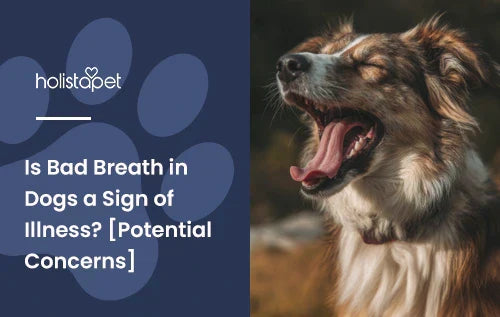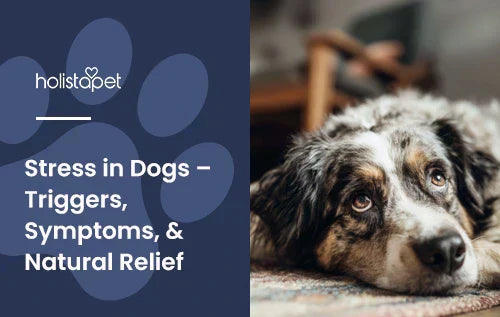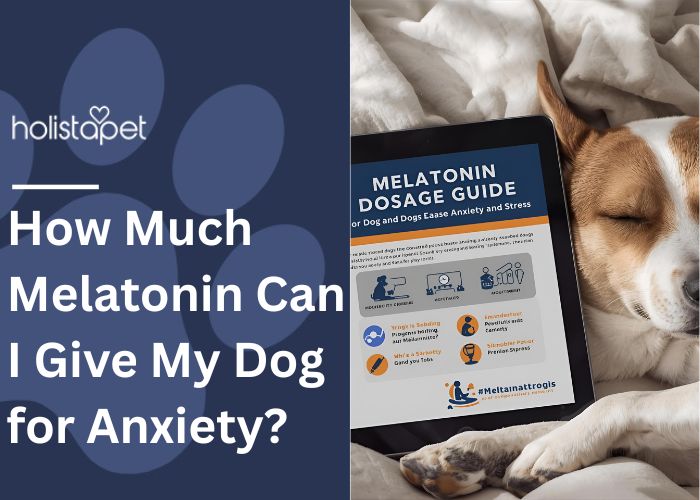You lean in for kisses, and suddenly, your dog’s breath greets you like a skunk. This may cause you to wonder, "Is bad breath in dogs a sign of illness?" Sometimes it can be, which is why you should never ignore it.
Occasional odor may come from food or leftover debris, but a strong or lasting smell often points to oral health issues or deeper problems. Paying attention helps you protect your pup’s well-being and catch trouble early.
Why Do Dogs Get Bad Breath?

Your dog’s bad breath often starts with poor dental care. Plaque hardens into tartar, trapping bacteria that release foul odors. Left alone, this buildup leads to gum disease, irritation, or even tooth decay.
Diet also plays a role—low-quality food, table scraps, or raiding garbage can make your dog’s breath smell worse. Smaller breeds with crowded teeth are at higher risk since food debris gets stuck easily.
Sometimes, however, the odor hints at more serious issues. Kidney disease, for instance, can cause an ammonia-like smell. Liver problems may give off a pungent odor. And diabetes often makes breath smell fruity or sweet.
Is Bad Breath a Sign of Illness In Dogs?
Like many pet parents, you may have asked yourself, “Is my dog's bad breath a sign of illness?” It can be, especially when the smell is strong, unusual, consistent, or coupled with other concerning symptoms. Occasional odor often comes from tartar, plaque, or food scraps. In other words, poor dental health.
But when your dog’s bad breath persists, it may point to bigger problems. Again, kidney disease can make breath smell like ammonia, liver disease may cause a musty odor, and diabetes often brings a fruity scent.
Other red flags include appetite changes, drooling, vomiting, or lethargy. If brushing or dental chews don’t help, chronic odor becomes a warning sign worth checking with your vet.
When Bad Breath May Signal an Underlying Issue
Bad breath sometimes signals more than food scraps or plaque. It can point to dental disease, gum infections, digestive problems, or even internal concerns like kidney or liver trouble.
Each issue comes with its own warning signs, from red gums to changes in appetite or energy. If your dog’s breath smell lingers or worsens, paying attention to other symptoms could help reveal the true cause behind the odor.
Dental Disease or Gum Infections
Your dog’s bad breath often comes from dental disease or gum infections. Plaque buildup hardens into tartar, giving bacteria a place to thrive. This causes red, swollen gums and can progress to periodontal disease, tooth decay, or abscesses.
You may notice drooling, pawing at the face, or reluctance to eat crunchy foods. Without care, bacteria spread through the bloodstream, harming organs. Regular brushing, dental chews, and vet cleanings keep your dog’s teeth and gums in better shape.
Digestive Problems and Poor Gut Health
Not all bad breath starts in your dog’s mouth. Digestive problems and poor gut health often create odors that rise into the breath. An unbalanced gut microbiome, acid reflux, or frequent vomiting leaves behind sour smells.
Food intolerances or poor digestion also cause fermentation in the gut, producing gases that worsen breath. Signs like bloating, diarrhea, or weight loss may appear alongside the odor. Since brushing won’t solve these issues, lasting smells need a vet’s attention for proper care.
Kidney, Liver, or Other Internal Conditions
When your dog’s breath smells unusually foul, metallic, or sweet, it may signal internal problems. Kidney or liver disease may be common culprits. In more advanced cases, kidney failure can also be involved. Kidney issues often cause an ammonia-like odor, while liver trouble can create a sickly-sweet smell.
Other warning signs include yellow gums, vomiting, loss of appetite, and unusual tiredness. Increased thirst and frequent urination may appear with kidney disease or kidney failure. Because these symptoms are serious, see your vet right away for an accurate diagnosis.
Other Symptoms to Watch Alongside Bad Breath
Bad breath combined with other changes often signals more than simple dental issues. Reluctance to eat, especially crunchy food, may point to soreness in the mouth. Vomiting, drooling, or weight loss can be connected to digestive problems or systemic illness.
Lethargy suggests infection or organ strain, while swollen gums, tartar buildup, or loose teeth signal oral disease. When your dog’s bad breath persists with these symptoms, it’s an early warning that professional care is needed to protect overall health.
Natural Ways to Help Freshen Your Dog’s Breath
You can manage your dog’s breath at home with simple daily care and the right products. A few small steps can make a big difference in keeping odors away.
- Regular Brushing and Dental Care – Brushing with dog-safe toothpaste helps remove plaque and keep teeth clean.
- Providing Healthy Chew Options – Holistapet Fresh Breath Sticks and Chews support cleaner teeth and fresher breath.
- Supporting Gut Health Through Nutrition – Holistapet Probiotics for Dogs aid digestion and promote better oral freshness.
Holistapet Products That Can Help

Holistapet makes caring for your dog’s breath simple with two natural, probiotic-packed solutions designed to freshen breath and support oral health.
Fresh Breath Chews for Dogs
These chews combine spirulina, kelp, parsley, peppermint leaf, and coriander to naturally freshen your dog’s breath. Each chew also delivers 300 million CFU of probiotics from 18 strains, reducing odor-causing microbes while supporting digestion.
Made with wholesome ingredients like chickpea flour and sweet potato, they can be given daily to help manage plaque and tartar while supporting long-term oral care.
Fresh Breath Dental Sticks
These sticks feature the same blend of herbs and superfoods for breath freshness, while also working as a chew to help scrub your dog’s teeth.
Each stick provides 300 million CFU of probiotics to balance gut bacteria and reduce odor. With an all-natural formula free of artificial colors or flavors, they complement brushing and make dental care simple.
Probiotic Chews for Dogs
Probiotics may help with bad breath in dogs by restoring balance in the gut and mouth. They introduce beneficial bacteria that reduce odor-causing microbes, support digestion, and even promote healthier gums. While not a cure-all, adding probiotics alongside brushing and dental chews can make a noticeable difference in your dog’s breath.
When to See a Vet About Bad Breath
You should see a vet if your dog’s bad breath lingers, worsens, or doesn’t improve with brushing, dental chews, or diet changes. Persistent odor often signals deeper issues beyond a lack of brushing. Also, if your dog’s bad breath comes with other worrisome symptoms, it’s definitely time for the vet.
Warning signs like swollen gums, loose teeth, appetite loss, lethargy, digestive issues, or unusual breath smells—such as fruity, sweet, or ammonia-like—need professional care. A vet can run tests, provide treatment, and protect both your dog’s oral and overall health.
FAQs – Bad Breath in Dogs
What is the most common cause of bad breath in dogs?
The most common cause is dental disease. Plaque and tartar buildup create bacteria that lead to gum problems, tooth decay, and strong odors.
Is fishy dog breath a sign of illness?
Yes, fishy breath often signals dental or gum disease. Bacteria in the mouth produce foul odors, making it important to check your dog’s teeth and gums. In some cases, a blocked or infected anal gland can also cause a strong, fishy odor on your dog’s breath.
Can sweet breath be a sign of illness in dogs?
Yes, sweet-smelling breath may signal diabetes. Ketones in the bloodstream create a fruity odor, often appearing alongside increased thirst, urination, and appetite changes in diabetic dogs.
Can probiotics help improve bad breath?
Yes, probiotics balance gut bacteria, support digestion, and reduce odor-causing microbes. Adding probiotics to your dog’s routine can improve gut health and help freshen persistent bad breath.
How often should I give my dog dental chews or sticks?
Most dogs benefit from daily dental chews or sticks. Regular use helps reduce plaque and tartar buildup while keeping your dog’s breath fresher between brushings.
Final Thoughts – Is Bad Breath a Sign of Illness In Dogs?
Bad breath in dogs may seem minor, but it often reveals bigger problems. Paying attention to odor changes helps you spot early signs of oral or internal issues before they worsen.
Alongside vet visits and regular brushing, Holistapet Fresh Breath Chews and Dental Sticks offer simple support for fresher breath and better oral care.
By staying proactive and consistent, you protect your dog’s smile, comfort, and overall health. You get to keep those cuddles as sweet as they should be.


 CBD Oil for Dogs - Fast Acting
CBD Oil for Dogs - Fast Acting
 Chicken Flavored CBD Oil For Dogs - Easy Dose
Chicken Flavored CBD Oil For Dogs - Easy Dose
 Salmon Flavored CBD Oil For Dogs - Highly Rated
Salmon Flavored CBD Oil For Dogs - Highly Rated
 CBG Oil for Dogs and Cats - Loved by Thousands
CBG Oil for Dogs and Cats - Loved by Thousands





Leave a comment
All comments are moderated before being published.
This site is protected by hCaptcha and the hCaptcha Privacy Policy and Terms of Service apply.